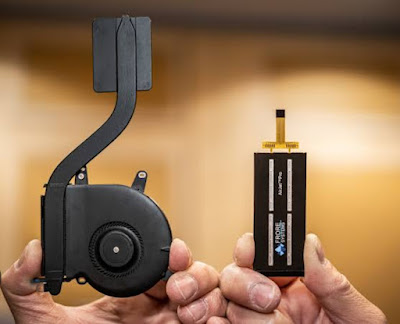Solid State Active Cooling Chip: The Future of Laptop Cooling
As laptops continue to become more powerful and compact, the need for efficient cooling solutions becomes increasingly important. The heat generated by modern CPUs and GPUs can lead to thermal throttling, which can significantly impact the performance of a laptop. This is where solid state active cooling chips come in.
A solid state active cooling chip is a type of cooling technology that uses advanced materials and technology to dissipate heat away from the computer's components in a more efficient manner than traditional passive cooling methods. This could potentially allow laptops to have thinner designs and run at higher performance levels without overheating.
One of the key benefits of solid state active cooling is its ability to transfer heat directly to the surrounding air, without the need for moving parts such as fans. This not only improves the overall efficiency of the cooling system, but also reduces noise levels and increases the lifespan of the laptop.
Another advantage of solid state active cooling is its ability to target specific areas of the laptop that are generating the most heat. This allows for more precise cooling and helps to prevent overheating in specific components, such as the CPU or GPU.
The materials used in solid state active cooling chips are typically highly thermally conductive, which allows for efficient heat transfer. Some examples of materials used in this technology include graphene, boron nitride and diamond. These materials have extremely high thermal conductivity, making them ideal for use in cooling applications.
In addition to the materials used, the design of the solid state active cooling chip is also important. One popular design is the use of a heat spreader, which is a thin layer of thermally conductive material that is placed between the heat source and the cooling mechanism. This helps to evenly distribute the heat across the cooling surface, improving the overall efficiency of the cooling system.
Another design that is gaining popularity is the use of phase-change materials (PCMs) in solid state active cooling chips. PCMs are materials that can change phase, or state, from solid to liquid, depending on the temperature. This allows them to absorb and release heat in a controlled manner, improving the overall efficiency of the cooling system.
Despite the many advantages of solid state active cooling, this technology is still under development and is not yet widely available in the market. However, it is an exciting area of research and has the potential to revolutionize the way laptops are cooled in the future.
One of the main challenges in developing solid state active cooling technology is the cost. The materials and technology used in this type of cooling solution are still quite expensive, which makes it difficult to implement in mass-produced laptops. However, as the technology continues to advance and the cost of materials decreases, it is likely that we will see more and more laptops incorporating solid state active cooling in the future.
Another challenge is the size of the cooling system. Traditional passive cooling systems, such as heat sinks and fans, can be quite bulky, which makes it difficult to incorporate them into a laptop's design. Solid state active cooling systems, on the other hand, are typically much smaller and can be more easily integrated into a laptop's design.
In conclusion, solid state active cooling chips are a promising new technology that could greatly improve the performance and lifespan of laptops. As this technology continues to develop and become more widely available, it is likely that we will see more and more laptops incorporating this type of cooling solution in the future. With the ability to transfer heat directly to the surrounding air, precise cooling for specific components, and the usage of advanced materials, solid state active cooling has the potential to revolutionize the way laptops are cooled.
However, it is important to note that this technology
Air jet solid state active cooling
Air jet solid state active cooling is a method of cooling electronic devices, such as CPUs and GPUs, in which high-pressure air is directed onto the surface of the device to dissipate heat. This type of cooling is often used in high-performance computing applications and in situations where traditional cooling methods, such as liquid cooling, are not practical. The term "solid state" refers to the fact that the cooling system does not rely on any moving parts, such as fans or pumps, to circulate cool air over the device. Instead, the cooling is achieved through the use of air jets.
For more details..
https://www.pcworld.com/article/1388332/new-airjet-chips-can-double-a-laptops-performance.html


Comments
Post a Comment
If you have any questions, Please let me know